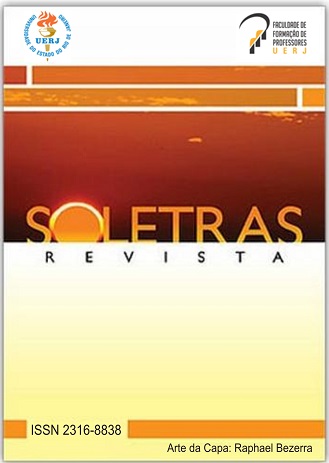"Pai contra Mãe", by Machado de Assis, theoretical-critical study about black people in brazilian literature
DOI:
https://doi.org/10.12957/soletras.2024.80263Keywords:
Machado de Assis, Pai contra Mãe, Black in literature, Reading circle, TeachingAbstract
The great challenge for literature teachers is to train literary readers. Achieving this goal requires planning and applying systematized teaching strategies that are possible in everyday school life. Another challenging issue is the introduction of classic texts that attract the attention of these young people. The aim of this article is therefore to present high school literature teachers with a reading strategy developed as part of the scientific initiation research, which leads students to reflect on the role of black people in contemporary Brazilian society, motivated by canonical literature. So, we took Machado de Assis' short story, Pai contra Mãe, as a reference. It presents a plot that focuses on the situation of black people in Brazilian society and is analyzed using a theoretical-critical approach based on a 21st century perspective, combining studies of Narratology, Reception Aesthetics and Rildo Cosson's Reading Circles methodology. The strategy developed for reading the short story allows students to understand the present socio-cultural context, the aesthetic resources that generate meaning, motivating them to collectively construct new meanings arising from their experience of the world and of being a reader, and realizing the importance of the past in understanding the present.
Downloads
Published
Issue
Section
License
The approval of the article implies the immediate and free transfer of the publication rights in this journal. The author (s) authorize the Postgraduate Program in Literature and Linguistics (PPLIN) to reproduce it and publish it in Revista SOLETRAS, understanding the terms "reproduction" and "publication" in accordance with Definition of article 5 of Law 9610/98. The author (s) will continue to own the copyright for subsequent publications. The article can be accessed by the world wide web (http://www.e-publicacoes.uerj.br/index.php/soletras), being allowed, free of charge, the consultation and the reproduction of copy of the article for own use. Cases of plagiarism or any illegalities in the submitted texts are the sole responsibility of their authors.



